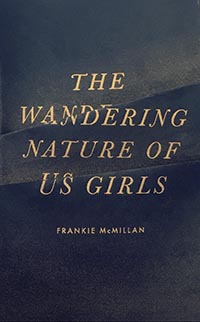The Wandering Nature of Us Girls, Frankie McMillan, Canterbury University Press, 2022
The feel of a book in hand matters. Holding Frankie McMillan’s new collection, The Wandering Nature of Us Girls, is immensely satisfying. The size and shape, the paper stock, the pale blue title pages, the choice of font and font size, the breathing space. A perfect alchemy of design and production.
The dedication page: “For Marvin, / who taught me how to wander. / Without you, I would never have gotten lost.” This is the keyhole entry into a book where wandering becomes wondering; we get lost in wonder and wander, whether reader or writer. The collection of small stories performs bridges between both, in so many delicious ways. Even me naming the pieces is a mental excursion through form and label; how we tag what we write from poetry to prose to essay to fiction to short story, and any number of hybrid marriages.
The book is offered as small stories so I am running with that. Think mouthfuls of narrative or let’s say fiction. Think past and present. Think stepping stones from the miniature to wider issues, issues hungry for human attention: love, death, loss, violence, curiosity. Think anchors in the real, and offshoots in the hyperreal, sidelines in the surreal.
Water is the connective tissue, and if you think of the ever-changing appearance and movement of water, it is extremely apt. Frankie often crafts long sentences, sentences an Italian novelist might favour, sentences that showcase the currency of water. Extended tidal rhythms, the water breathing in and out. It makes me think again of wander, and the flâneur comes to mind, the bricoleuer, with both reader and writer meandering, amassing detail, absorbing atmosphere.
Water is the connective tissue and like the ocean it is a meeting ground of dark and light. The grandmother goes swimming, others go swimming, but there are drownings, there are bodies missing at sea. This is a collection of mystery, of gaps in the narrative, of surprising turn of events, of tragedy. Most definitely tragedy, terrible twists in events. The aunt who loves sweeping stays home in the flood, sweeping out the water, until the point she is on the roof, still sweeping, still sweeping, until she and broom and house are swept away.
There is such power in Frankie’s imagination. A beaked mouth, an antlered head. A baby under a tree writing a thesis on “aerial domesticity”. There are the acrobatics of circuses, of putting on a show. There are the subcurrents of our planet under grave threat. The tragedy we must face. Along with violence against women, ‘us girls’, and suddenly, slowly, the meandering takes on a greater insistent force. We are wandering and wondering, and there are consequences, cause and effect.
The mood and ideas a book generates matters. The Wandering Nature of Us Girls is less concerned with geography than with movement, with action, with human connections. It is a handbook of curious and gut smacking things. It is a book you feel as well as a book you think. It is a book of catastrophe and a book of epiphany. Small story brilliance.
Frankie McMillan is the author of five books of poetry and short fiction. Her most recent collection, The Father of Octopus Wrestling, was listed by The Spinoff as one of the 10 best New Zealand fiction books of 2019 and shortlisted for the NZSA Heritage Book Awards, and her 2016 collection, My Mother and the Hungarians, was longlisted for the Ockham New Zealand Book Awards. She has twice won the New Zealand Flash Fiction Day competition and has been the recipient of numerous awards and residencies, including the NZSA Peter and Dianne Beatson Fellowship (2019), the Michael King writing residency at the University of Auckland (2017), and the Ursula Bethell residency in creative writing at the University of Canterbury (2014). McMillan spends her time between Ōtautahi Christchurch and Mohua Golden Bay.
Canterbury University Press page
Girls Raised by Swans on Poetry Shelf (‘Accounts of Girls Raised by Swans’)

